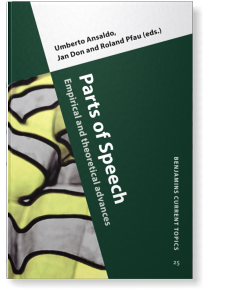Parts of Speech
Empirical and theoretical advances
Editors
Parts of Speech are a central aspect of linguistic theory and analysis. Though a long-established tradition in Western linguistics and philosophy has assumed the validity of Parts of Speech in the study of language, there are still many questions left unanswered. For example, should Parts of Speech be treated as descriptive tools or are they to be considered universal constructs? Is it possible to come up with cross-linguistically valid formal categories, or are categories of language structure ultimately language-specific? Should they be defined semantically, syntactically, or otherwise? Do non-Indo-European languages reveal novel aspects of categorical assignment? This volume attempts to answer these and other fundamental questions for linguistic theory and its methodology by offering a range of contributions that spans diverse theoretical persuasions and contributes to our understanding of Parts of Speech with analyses of new data sets.
These articles were originally published in Studies in Language 32:3 (2008).
[Benjamins Current Topics, 25] 2010. vi, 291 pp.
Publishing status: Available
© John Benjamins Publishing Company
Table of Contents
-
Parts-of-Speech: Particulars, universals and theoretical constructsUmberto Ansaldo, Jan Don and Roland Pfau | pp. 1–4
-
Word classes in sign languages: Criteria and classificationsWaldemar Schwager and Ulrike Zeshan | pp. 5–41
-
Roots, stems and word classesChristian Lehmann | pp. 43–64
-
Precategoriality and syntax-based parts of speech: The case of Late Archaic ChineseWalter Bisang | pp. 65–86
-
Covert word classes: Seeking your own syntax in Tukang BesiMark Donohue | pp. 87–106
-
Pragmatic factors in the development of a switch-adjective language: A case study of the Miyako-Hirara dialect of RyukyuanYulia Koloskova and Toshio Ohori | pp. 107–133
-
The acquisition of syntactic categories in Jakarta IndonesianDavid Gil | pp. 135–167
-
Possible phonological cues in categorial acquisition: Evidence from adult categorizationJan Don and Marian Erkelens | pp. 169–181
-
Lexical semantic constraints on noun roots and noun borrowabilityLynn Nichols | pp. 183–200
-
Degree words, intensification, and word class distinctions in romance languagesVentura Salazar-García | pp. 201–226
-
On flexible and rigid nounsJan Rijkhoff | pp. 227–252
-
Parts of speech and dependent clauses in Functional Discourse GrammarKees Hengeveld and Eva van Lier | pp. 253–285
-
Languag index | pp. 287–288
-
Subject index | pp. 289–291
“My evaluation of the volume is strongly positive. Besides the very high quality of every contribution, I particularly appreciated the continuity of the discussion in which the assorted parts fit well together: every essay is functional to and helps a better comprehension of the others. Even the order in which the papers have been presented helps the reader to follow the thread of discussion, despite the differences of topics and theoretical frameworks of the papers.”
Germana Olga Civilleri, Roma Tre University, on Linguist List 22.2283, 2011
“In sum, the book is an important contribution to the current debate on the PoS. It is highly recommended to scholars that have a specific interest in PoS research, and may be suggested to others. Furthermore, the link between PoS theory and historical linguistics makes the book (and, generally, the literature on PoS typology) a good buy for libraries interested in Indo-European and Semitic linguistics.”
Luca Alfieri, in Studies in Language 37(2): 425-434, 2013
Cited by (3)
Cited by three other publications
Engerer, Volkmar
van Lier, Eva
This list is based on CrossRef data as of 18 july 2024. Please note that it may not be complete. Sources presented here have been supplied by the respective publishers. Any errors therein should be reported to them.
Subjects
Main BIC Subject
CFK: Grammar, syntax
Main BISAC Subject
LAN009000: LANGUAGE ARTS & DISCIPLINES / Linguistics / General
